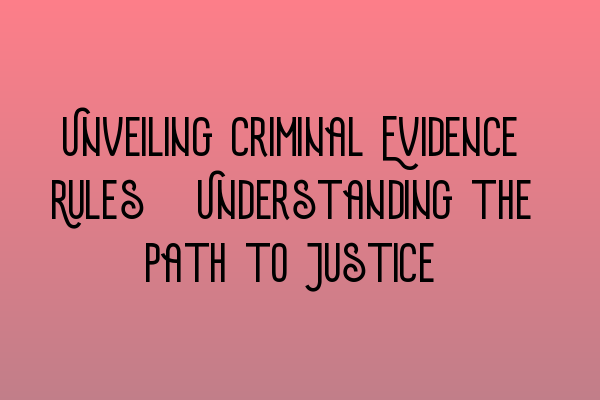Unveiling Criminal Evidence Rules: Understanding the Path to Justice
When it comes to criminal cases, the rules governing the admissibility and presentation of evidence play a crucial role in ensuring a fair and just trial. These rules, known as criminal evidence rules, are designed to protect the rights of the accused, maintain the integrity of the justice system, and help establish the truth. In this article, we will delve into the intricacies of criminal evidence rules and shed light on their importance in the pursuit of justice.
The Purpose of Criminal Evidence Rules
The primary purpose of criminal evidence rules is to ensure that only reliable and relevant evidence is presented in court. These rules safeguard against the admission of irrelevant or prejudicial information that could unfairly sway the jury or infringe upon the accused’s rights. By establishing strict guidelines for the admission and exclusion of evidence, criminal evidence rules aim to prevent wrongful convictions and promote a fair trial.
One of the key principles underlying criminal evidence rules is the presumption of innocence. This fundamental principle holds that an accused person is innocent until proven guilty beyond a reasonable doubt. To uphold this principle, the burden of proof lies with the prosecution, who must present admissible evidence that convincingly demonstrates the accused’s guilt.
Types of Evidence
Under criminal evidence rules, evidence can be classified into different categories, each with its own requirements for admissibility. Let’s explore the main types of evidence encountered in criminal proceedings:
- 1. Direct Evidence: Direct evidence refers to evidence that directly proves a fact in dispute without requiring any inference or presumption. It includes eyewitness testimonies, video recordings, photographs, and other tangible evidence. Direct evidence is generally considered highly reliable and is often given significant weight in court.
- 2. Circumstantial Evidence: Circumstantial evidence, also known as indirect evidence, consists of facts and circumstances that allow the jury to draw inferences about the ultimate issue in the case. Unlike direct evidence, circumstantial evidence does not directly prove the accused’s guilt. However, when properly presented and analyzed, it can be just as compelling and convincing.
- 3. Expert Evidence: Expert evidence involves the testimony of qualified professionals who possess specialized knowledge or expertise in a particular field. Experts, such as forensic scientists or medical professionals, provide their opinion or interpretation of the evidence based on their expertise. The admissibility of expert evidence requires the court to assess the expert’s qualifications, the relevance of their opinion, and the validity of their methodology.
Admissibility of Evidence
While the specific rules regarding the admissibility of evidence can vary depending on the jurisdiction and the nature of the case, there are general principles that guide their determination. Criminal evidence rules may consider factors such as relevance, reliability, fairness, and public policy when deciding whether to admit or exclude evidence.
Relevant evidence, which has a tendency to make a fact of consequence more or less probable, is generally admissible. However, evidence that is deemed unfairly prejudicial, excessively cumulative, or based on unreliable sources may be excluded.
In addition to these general principles, the admissibility of evidence is also subject to specific rules and exceptions. For example, certain categories of evidence, such as privileged communications between attorneys and clients or confidential medical records, may be protected from disclosure.
Conclusion
Criminal evidence rules form the backbone of the justice system, ensuring that only reliable and relevant evidence is considered in criminal trials. They are essential for upholding the rights of the accused, maintaining the integrity of the judicial process, and ultimately achieving justice.
If you’re interested in learning more about criminal law and legal practice in the UK, we recommend checking out our related articles:
- SQE 1 Practice Exam Questions
- SQE 1 Practice Mocks FLK1 FLK2
- SQE 2 Preparation Courses
- SQE 1 Preparation Courses
- SRA SQE Exam Dates
